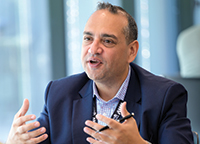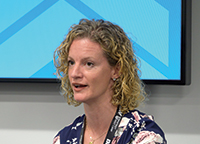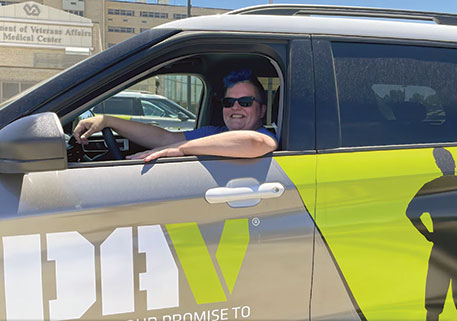
Former Marine Raider and DAV member Keith Waldrop knows what it’s like to search for purpose after military service.
With nearly 14 years of special operations experience and an upbringing in the trades, Waldrop was well equipped to transition into a new career. He quickly found success working in construction, but it wasn’t quite right.
“Nine months into it, I was already kind of getting an itch and then realized that maybe this isn’t my new identity,” Waldrop said. “And that’s ultimately what ended up landing me here on this entrepreneur path that I went down.”
In 2016, Waldrop joined his business partner in building up Asymmetric Solutions, a private special operations company that provides training and security solutions for the military, law enforcement and civilians. It was a natural fit for Waldrop given his experience and interests.
Even more gratifying for him is the team he gets to work with—99% of the company’s 17 full-time employees and its roughly 75 contractors are all veterans.
“That’s the best, the most rewarding part of this company,” said Waldrop, an alumnus of DAV Patriot Boot Camp for entrepreneurs in the veteran- and military-connected community.
Asymmetric Solutions has a rigorous hiring and screening process. Military veterans are the only candidates who qualify for most of the company’s positions. Waldrop said that standard is 100% responsible for the company’s reputation and success.
But it’s not just the special ops field that reaps the rewards of hiring veterans. Many veterans-turned-entrepreneurs, like Waldrop, know firsthand what a military background can bring to a startup.

“I’ve found that military veterans have a different tolerance for pain and have a different tolerance for ambiguity,” said Navy veteran and DAV Patriot Boot Camp alumnus Ali Ahmadi.
“Their superpower is being thrown into situations that they can troubleshoot their way out of … and that’s really what the business world is—it’s continuously solving problems.”
Seven years ago, Ahmadi co-founded TCARE Inc., a data and analytics platform that connects caregivers to supportive resources to help reduce burnout. The company employs nearly 170 people in the U.S., over 30% of whom are veterans.
“That’s all by design,” Ahmadi said. “You have a lot of veterans that their reason for what they wake up for every morning is a lot more mission-driven than just a paycheck … which then translates to that company’s outcomes.”
It’s that focus on mission that attracts investors to companies led by veterans. Emily McMahan is an Army veteran and the co-founder of AIN Ventures and the Academy Investor Network (AIN), a venture capital fund and investment syndicate that invests in early-stage startups. The fund focuses on deep tech companies with commercial and government applications and on veteran-led ventures.
According to AIN, veteran-led, early-stage startups have a history of outperforming their nonveteran peers based on revenue, a testament to the grit and perseverance inherent in a military background and required for a successful business.

“When it comes to these early-stage founders, one of the big tests is, can they ultimately surround themselves with the right team?” said McMahan, who sits on the DAV National Veterans Entrepreneurship Council. “And so, especially with respect to technical skills or operations, I think it’s a great thing for folks to ultimately bring military veterans on.”
McMahan said early-stage founders are likely to tap in to their own circle of trusted friends and colleagues. For veterans, that means other veterans.
“Investing is very high risk. And so, how do you reduce the risk of something that’s inherently very risky? I think it’s doing it with people that you inherently have some sort of trust in [and know] that they’re reliable, that they’re sincere, that they’re competent,” McMahan said. “And I think that we ultimately care about each other at that baseline level, which I think is really important.”
Camaraderie and trust are part of what makes programs such as DAV Patriot Boot Camp so special, according to alumni. Surrounded by people with similar experiences and values, participants feel safe asking for and receiving help. They’re also eager to give back, with many alumni—including Ahmadi and McMahan—returning as mentors.
“When our alumni succeed as entrepreneurs, they empower their brothers and sisters from the military-connected community, whether it’s through meaningful employment or mentorship,” said DAV Chief Communications and Outreach Officer Dan Clare. “In turn, those companies achieve great success and positively impact the industries and people they serve. That holistic approach makes all of us stronger, and it’s how we take care of each other for a lifetime.”
In addition to its entrepreneurship program, DAV’s employment department hosts dozens of job fairs across the country every year specifically for transitioning service members, veterans and spouses. Patriot Employer Recognition Program further supports meaningful employment by educating employers and recognizing those that are dedicated to hiring and supporting veterans.
Learn more at Patriot Employer Recognition Program. Find no-cost benefits help and other resources at dav.org.





